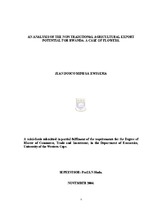| dc.contributor.advisor | Huda, S.N. | |
| dc.contributor.author | Rwigema, Jean Bosco Minega | |
| dc.contributor.other | Dept. of Economics | |
| dc.contributor.other | Faculty of Economics and Management Sciences | |
| dc.date.accessioned | 2013-08-07T12:13:04Z | |
| dc.date.available | 2007/04/30 09:20 | |
| dc.date.available | 2007/04/30 | |
| dc.date.available | 2013-08-07T12:13:04Z | |
| dc.date.issued | 2004 | |
| dc.identifier.uri | http://hdl.handle.net/11394/1844 | |
| dc.description | Magister Commercii - MCom | en_US |
| dc.description.abstract | Rwanda is constrained by an export structure that is heavily dependent on one or a few agricultural export products such as coffee, tea , pyrethrum and cinchona. The country did not manage to industrialize or to diversify its export structure significantly during the post-independence period. The situation was worsened by the civil war of 1994, which almost destroyed all sectors of the economy. Traditional export crops, such as coffee, cotton, tea, cocoa, palm oil, and tobacco are all subject to large price fluctuations and declining world market prices. This paper considered the case for diversification into non-traditional agricultural exports as a strategy for improving a developing country's terms of trade. The study put forward a case of Higland Flowers Project; a flowers project located in rural Kigali about 5 kilometers to the Kigali International airport. | en_US |
| dc.language.iso | en | en_US |
| dc.publisher | University of the Western Cape | en_US |
| dc.subject | Agriculture | en_US |
| dc.subject | Economic aspects | en_US |
| dc.subject | Rwanda | en_US |
| dc.subject | Cut flower industry | en_US |
| dc.subject | Flowers | en_US |
| dc.subject | Marketing | en_US |
| dc.subject | Export marketing | en_US |
| dc.title | An analysis of the non-traditional agricultural export potential for Rwanda: a case of flowers | en_US |
| dc.type | Thesis | en_US |
| dc.rights.holder | University of the Western Cape | en_US |
| dc.description.country | South Africa | |

